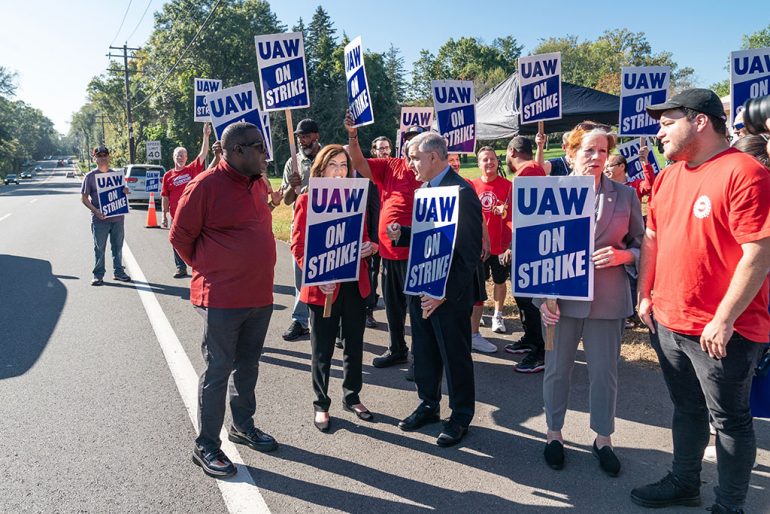
The United Auto Workers (UAW) made a strategic decision to refrain from additional strikes against Detroit’s three major auto plants, attributing this move to General Motors’ unexpected decision to include workers at joint-venture battery plants in union contracts. UAW President Shawn Fain acknowledged that their ongoing strike had been effective but emphasized that their objectives had not been fully achieved yet.
Automakers had significantly increased initial wage hike offers, agreed to raise wages in line with inflation, and improved conditions for temporary workers. However, the UAW was still pushing for higher wages, the elimination of a two-tier wage system, and the extension of union representation to battery facilities at all three automakers.
Until this recent development, the UAW had been escalating actions against different automakers on a weekly basis in pursuit of their demands. The threat of a strike against GM’s Arlington, Texas plant, responsible for producing profitable SUVs like the Cadillac Escalade, had spurred GM to accept that electric vehicle (EV) battery factories should have UAW contracts.
The growth of electric vehicles, partly fueled by federal subsidies to reduce carbon emissions, prompted the UAW to seek equal pay and job protections for workers in EV-related roles. This was seen as a significant step in securing a contract for all vehicle manufacturers, according to industry experts.
However, the details of pay and benefits for workers in GM’s battery plants were not disclosed. GM is in the process of constructing three Ultium joint-venture battery plants with LG Energy Solution and another U.S. battery plant with Samsung SDI. The UAW’s push for national labor agreements at these facilities had faced opposition, but GM’s recent concession marked a crucial shift.
Harley Shaiken, a labor professor at the University of California, Berkeley, believed that GM’s move would likely influence Ford and Stellantis in their negotiations with the UAW.
Despite this progress, tensions remained high, with Ford announcing layoffs in Ohio and Michigan due to the strike’s impact on assembly plants. The automakers had been hesitant to include battery plants under the master agreement, arguing that many were joint ventures requiring approval from other majority owners.
While GM welcomed the development as a step towards a “just transition,” it declined to confirm the news and stated that negotiations were ongoing. Stellantis acknowledged progress but noted that there were still unresolved issues. Ford refrained from making a comment.
Competition in the electric vehicle market intensified as Tesla reduced prices, increasing pressure on traditional automakers to match the aggressive pricing strategy of Elon Musk’s company.
Fain also hinted at the possibility of strikes at highly profitable pickup truck plants if progress stalled, underscoring the UAW’s determination to secure favorable terms. He had kept automakers guessing about whether they would face additional plant shutdowns or concessions.
Fain’s regular video updates had become pivotal in this ongoing labor dispute, with significant implications for the stock prices of the automakers involved. GM shares saw a nearly 2% increase, Ford shares gained 0.8%, and Stellantis shares in Milan ended up 1% on the day of this development.

Mike Floyd is a finance executive by trade and a car enthusiast at heart. As a CFO with a keen eye for detail and strategy, Mike brings his analytical mindset to the automotive world, uncovering fresh insights and unique perspectives that go beyond the surface. His passion for cars—especially his favorite, the Porsche 911, fuels his contributions to Automotive Addicts, where he blends a love for performance and design with his professional precision. Whether he’s breaking down industry trends or spotlighting emerging innovations, Mike helps keep the site both sharp and forward-thinking.